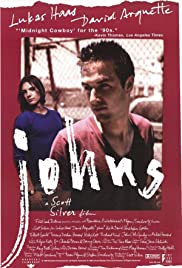
THE SPIDER’S WEB
UK, 1960, 85 minutes, Colour.
Glynis Johns, John Justin, Jack Hulbert, Cicely Courtneidge, Ronald Howard, David Nixon, Wendy Turner, Basil Dignan, Joan Sterndale- Bennett, Ferdy Mayne, Peter Butterworth, Anton Rodgers.
Directed by Godfrey Grayson.
This is a murder mystery based on an Agatha Christie novel. In its time, it was a supporting feature but was shown on television in the United States.
While there are a number of versions of Agatha Christie novels from the 1930s, the popularity of film and television versions began in the 1970s with Albert Finney as Poirot in Murder on the Orient Express, followed by Peter Ustinov in cinema films and television films, Angela Lansbury as Miss Marple. However, the great popularity of film versions of Agatha Christie mysteries is for television versions, the many films with David Suchet as Poirot and various actresses as Miss Marple, Joan Hickson, Geraldine Mc Ewan, Julia Mackenzie.
This seems a very modest version of an Agatha Christie story, all the action taking place within a country mansion. It has a good cast of British character actors led by Glynis Johns, who had a strong cinema career during the 1940s and 1950s – with Mary Poppins four years on and then Broadway, A Little Night Music with Send in the Clowns in the 1970s. John Justin is the leading man but spends most of the time offscreen. Ferdy Mayne is the sinister murder victim with Peter Butterworth as the inspector along with Anton Rodgers as his assistant. There is some burly comedy with Cicely Courtneidge.
Glynis Johns plays the wife of a career-diplomat, John Justin, stepmother to his 12-year-old daughter, Wendy Turner. Clarissa has a wild imagination, often speculating on macabre what if… kinds of stories. She has suspicious servants, husband-and-wife, who eventually have nothing to do with the crime. Cicely Courtneidge is the gardener who has questions of her own about the house and its contents.
Ferdy Mayne has married the ex-wife of Clarissa’s husband and wants custody of the daughter. However, he is also searching for contents in a secret drawer of a desk. The house was previously owned by a dealer. As it turns out, he has some old autographs, has written in invisible ink information about the victim’s drug deals, but one of Clarissa’s aristocratic friends turns out to be the murderer, not very excitingly dramatic, because he wanted possession of a valuable stamp.
There is comedy of mistaken identities, fabricated stories and many variations, the exasperated inspector, sometimes being corrected grammatically by his assistant, the little girl thinking that she had murdered the victim because she had stuck a pin in a doll with some voodoo formulations. And it is all complicated because the husband has to bring home, secretly, a VIP for government discussions.
Entertaining while it is on the screen, but not particularly startling, paling in comparison with the later Agatha Christie versions.